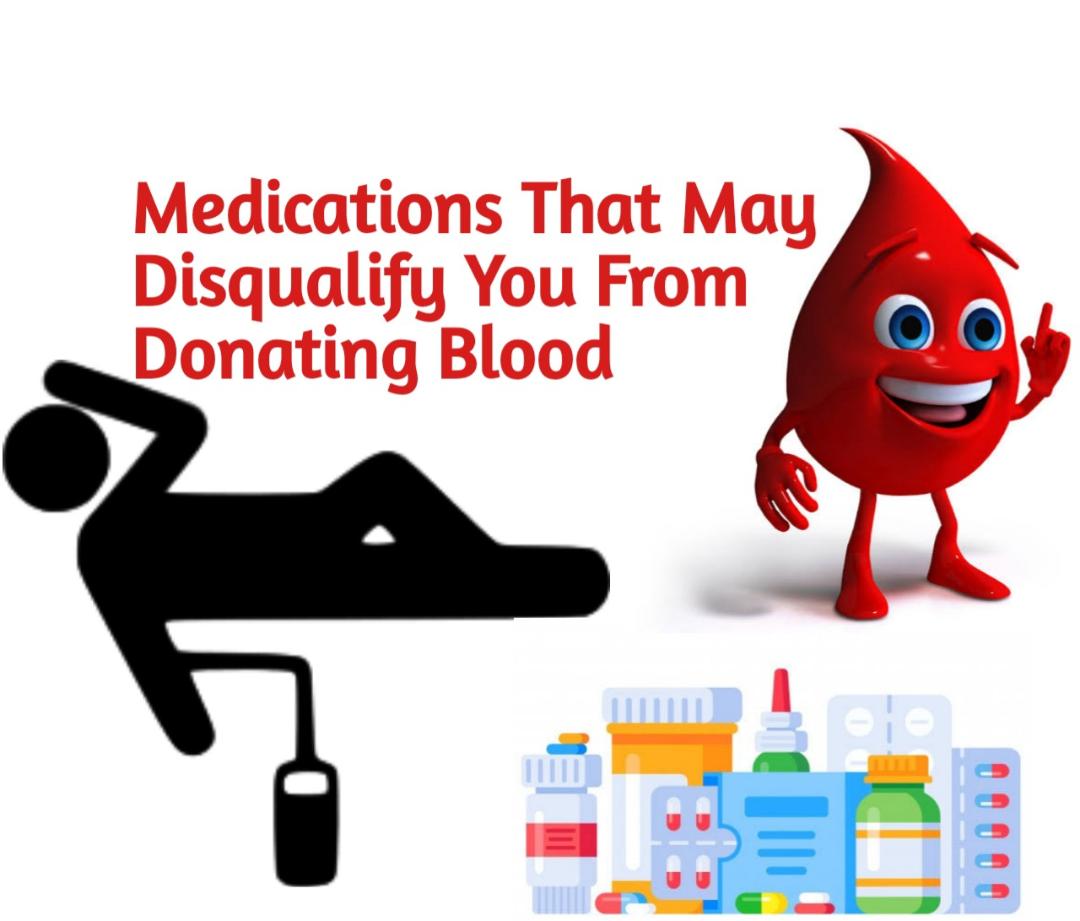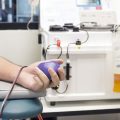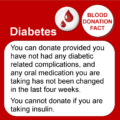A blood donation occurs when a person has blood drawn and used for transfusions and/or made into biopharmaceutical medications by a process called fractionation. Healthy people donate a small amount of their blood to be used for blood transfusions. People usually give 1 pint (about 450 milliliters, approximately less than 1/10th of the total amount of blood in the body), and often different components of the blood (see Blood Products) are separated and given to different people. Before blood donation donors are asked a series of questions about their health, factors that might affect their health, and countries they have visited. Certain conditions and factors can permanently or temporarily disqualify people from donating blood. Disqualifying factors typically are those that might make donation dangerous for the donor or risk transmitting a disorder to the recipient. The decision to accept or disqualify a donor can be complicated. The American Red Cross provides detailed information on its website.
Most people can eventually give blood even if they are disqualified at first because most conditions that disqualify donors are temporary. Donated blood is tested for many infections, so the chance of getting a disease from donated blood is very small.
Generally, donors are not allowed to give blood more than once every 56 days. The practice of paying donors for blood has almost disappeared because it encouraged needy people to present themselves as donors and then sometimes deny having any conditions that would disqualify them.
What Medications Disqualify You From Donating Blood
During a blood transfusion, safety is taken very seriously and as a result, if you are taking certain medications, you may not be allowed to donate blood. Most medications do not prevent people from donating blood. Common medications such as those used to control blood pressure, birth control pills, and over-the-counter medications do not affect your eligibility. But some prescription medicines can disqualify you from donating blood either permanently or temporarily.
Why Do Some Groups of Medications Disqualify You From Donating Blood?
Some medications affect your eligibility as a blood donor, due to the following reasons:
Anti-platelet agents: affect platelet function, so people taking these drugs should not donate platelets for the indicated time; however, you may still be able to donate whole blood.
Anticoagulants or “blood thinners”: are used to treat or prevent blood clots in the legs, lungs, or other parts of the body, and to prevent strokes. These medications affect the blood’s ability to clot, which might cause excessive bruising or bleeding when you donate.
Isotretinoin, finasteride, dutasteride acitretin, and etretinate: can cause birth defects. Your donated blood could contain high enough levels to damage the unborn baby if transfused to a pregnant woman. Once the medication has been cleared from your blood, you may donate again.
Erivedge (Vismodegib), and Aubagio (teriflunomide): can cause birth defects or the death of an unborn baby if transfused to a pregnant woman. Once the medication has been cleared from your blood, you may donate again.
Growth hormone from human pituitary glands: was prescribed for children with delayed or impaired growth. The hormone was obtained from human pituitary glands, which are in the brain. Some people who took this hormone developed a rare nervous system condition called CreutzfeldtJakob Disease (CJD, for short).
Insulin from cows (bovine, or beef, insulin): is an injected medicine used to treat diabetes. If this insulin came to the United States from the United Kingdom (where “mad cow disease” has occurred), it could contain material from cattle that have “mad cow disease.” Although no cases of the human type of “mad cow disease” have been reported in people treated with bovine (beef) insulin, there is concern that someone exposed to “mad cow disease” through beef insulin could transmit it to someone who receives their blood.
Hepatitis B Immune Globulin (HBIG): is an injected material used to prevent hepatitis B infection following a possible or known exposure to hepatitis B. HBIG does not prevent hepatitis B infection in every case, therefore, persons who have received HBIG must wait to donate blood.
Experimental Medication or Unlicensed (Experimental): Vaccine is usually associated with a research study, and the effect on the safety of transfused blood is unknown.
PrEP or pre-exposure prophylaxis: involves taking a specific combination of medicines as a prevention method for people who are HIV negative and at high risk for HIV infection.
PEP or post-exposure prophylaxis: is a short-term treatment started as soon as possible after a high-risk exposure to HIV to reduce the risk of infection.
ART or antiretroviral therapy: is the daily use of a combination of HIV medicines (called an HIV regimen) to treat an infection.
List Of Medication/Conditions and How Long They Can Disqualify You From Donating Blood
| If you are being treated with the following types of medication… | or have taken… | which is also called… | anytime in the last…. | |
| Anti-platelet agents (1) Usually taken to prevent stroke or heart attack |
Feldene | piroxicam | 2 days | |
| Effient | prasugrel | 3 days | ||
| Brilinta | ticagrelor | 7 days | ||
| Plavix | clopidogrel | 14 days | ||
| Ticlid | ticlopidine | 14 days | ||
| Zontivity | vorapaxar | 1 month | ||
| Anticoagulants or “blood thinners” (2) Usually to prevent blood clots in the legs and lungs and to prevent stroke |
Xarelto | rivaroxaban | 2 days | |
| Lovenox | enoxaparin | 2 days | ||
| Pradaxa | dabigatran | 2 days | ||
| Eliquis | apixaban | 2 days | ||
| Savaysa | edoxaban | 2 days | ||
| Fragmin | dalteparin | 2 days | ||
| Arixtra | fondaparinux | 2 days | ||
| Coumadin Warfilone Jantoven | warfarin | 7 days | ||
| Heparin, low molecular weight heparin (unless listed separately) | heparin | 7 days | ||
| Acne treatment (3) | Accutane | isotretinoin | 1 month | |
| Amnesteem | isotretinoin | 1 month | ||
| Absorica | isotretinoin | 1 month | ||
| Claravis | isotretinoin | 1 month | ||
| Myorisan | isotretinoin | 1 month | ||
| Sotret | isotretinoin | 1 month | ||
| Zenatane | isotretinoin | 1 month | ||
| Multiple myeloma | Thalomid | thalidomide | 1 month | |
| Rheumatoid arthritis | Rinvoq | upadacitinib | 1 month | |
| Hair loss remedy (3) | Propecia | finasteride | 1 month | |
| Prostate symptoms (3) | Proscar | finasteride | 1 month | |
| Avodart | dutasteride | 6 months | ||
| Jalyn | dutasteride | 6 months | ||
| HIV Prevention (PrEP and PEP) | Truvada | tenofovir | 3 months | |
| Descovy | emtricitabine | 3 months | ||
| Tivicay | dolutegravir | 3 months | ||
| Isentress | raltegravir | 3 months | ||
| Basal cell skin cancer (4) | Erivedge | vismodegib | 7 months | |
| Odomzo | sonidegib | 24 months | ||
| Relapsing multiple sclerosis (4) | Aubagio | teriflunomide | 2 years | |
| Psoriasis (3) | Soriatane | acitretin | 36 months | |
| Tegison | etretinate | Ever | ||
| HIV treatment is also known as antiretroviral therapy (ART) | Ever | |||
| Hepatitis exposure (5) | Hepatitis B Immune Globulin | HBIG | 12 months | |
| Multiple myeloma | Thalomid | Thalidomide | 1 month | |
| Immunosuppressant | Cellcept | mycophenolate mofetil | 6 weeks | |
| Rheumatoid arthritis | Arava | leflunomide | 24 months |
DO NOT discontinue medications prescribed or recommended by your physicians in order to donate blood.
FAQ
Can I give blood after having coronavirus or the vaccine?
Yes, if you have had a coronavirus vaccine as part of the global vaccination program, wait 7 full days after having the vaccine before coming to give blood on the 8th day.
Can I donate if I have a cold?
No, if you are sneezing and coughing or very congested, you should not attend. It is important that you do not have any infection at the time of donating. If you are unsure, it is best not to give blood.
Can I donate if I feel ill or have a cold sore?
If you are feeling under the weather, it’s best that you wait until you feel better before you give blood. Use our health & eligibility section to find out more.
Can I donate blood if I am taking antibiotics or have an infection?
You must be completely healed or recovered from any infection for at least 14 days before you give blood. If you are taking antibiotics, you may need to wait a period of time after your last tablet. Please follow our advice about donating after an infection. Please also see our advice about donating after antibiotics.
Can I donate if I am pregnant, or have recently been pregnant?
During your pregnancy, you are not able to give blood. If you had a blood transfusion during your pregnancy or at delivery, then you will not be able to become a blood donor. Please follow our advice about giving blood during and after pregnancy.
Can I give blood if I am receiving medical treatment or taking medication?
We’ll need to check that you can donate. Whether or not you can donate will depend on the medication you are receiving as well as the condition for which you are being treated. Please search for your condition or medication in our health & eligibility section.
Can I give blood if I have been to the dentist or received dental treatment?
Simple fillings and checkups are usually ok after 24 hours. However, some treatments will mean a longer deferral. ALSO SEE: Can You Donate Blood If You Take Xanax?





